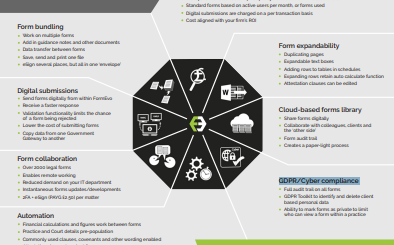Back to Basics — a Business Briefing for Lawyers: Managing

Welcome to the latest edition of Back to Basics — a Business Briefing for Lawyers. This month the focus is on Managing. Each edition of Back to Basics addresses a single management item and on this occasion I felt that it would be sensible to consider some of the processes that go into managing. It’s made up of many, many components and we can only scratch the surface in the limited space we have available in this publication—but we’ll touch on some of the essential elements you need to consider. Effective management is something you need to work hard to achieve—and you need to use a very wide range of skills and tools. It can take years to develop as an effective manager and you have to start somewhere—and where better than with the basics! If you need any help in creating systems or tools to assist you in your management efforts please get in touch with me—I’d be delighted to help.
Brian O’Neill LL.B MBA
Business Consultant
40c Drakemyre
Dalry
North Ayrshire
KA24 5JE
t. 07855 838395
Managing
Running your own business can be a bit like fitting together a jigsaw puzzle— you know all of the pieces are there, but it’s not always easy to find the right pieces in the right order and fitting them together. Management in a legal firm has always been viewed as something you learn on the job—or not, as the case may be. This leads to many, many difficulties, not least of which is having to make decisions without enough information to support them. Ad hoc management decisions inevitably produce results that are unexpected and generally poor. These lead to further ad hoc decisions being made which simply compound the problems. I’m not suggesting for a minute that management is an easy thing to do or that it is a panacea for everything that goes on in a legal firm.
If management is simply a case of “doing it by the numbers” then everyone could do it and become a success. There are, however, some fundamentals that need to be put in place for the smooth operation of any firm. There should be a clear purpose—where is the firm going? There should be some sort of “plan” to get there—and a written plan with specific objectives or milestones is critical. This is an essential tool to help you assess how you are performing. You need to ensure that your financial information is current and that you can see how your monthly results impact on your overall annual projections—and what that will mean to you in cash terms. You also need to make sure that you let your clients and the public know what you can do for them. These are just some of the pieces of the puzzle and your challenge is to fit them together in the right way to create a business that is effective and successful.
A view from the High Street
I’m delighted to welcome Austin Lafferty as my guest contributor in this edition. In his firm, Austin has developed his managing role over the years and now operates a distributed practice across 3 branches. In addition to managing his firm, Austin is Vice-president elect of The Law Society of Scotland and takes up office at the end of this month.
Here’s what Austin has to say on the subject:
Like so many solicitors with a relatively small firm, I started out with little idea of management, and, frankly/sadly, something not much more than contempt for that function, which was regarded as a minor function that sat in a backroom role around the edges of running a law practice. In other words, it was assumed that clients would come in, the solicitor and staff would do the work, get paid, and move on to the next case/transaction. I learned over a few years that if this philosophy had any traction, it would have been many years ago in a different world. The reality was and is that structured, planned management can either increase your profits while reducing your risks, or, in rough times, can secure your survival. I remember watching an episode of LA Law (it dates me, I know) and the story was that the managing partner (Douglas Brackman – bald but handsome…) was ridiculed by the glamorous litigators and real estate whizzkids for creating no fees and being a boring and almost worthless functionary who was only holding them back from bigger and better things. He went on strike. Within 3 days the whole firm ground to a fractious halt with mayhem and loss everywhere. Message received. No lawyer is an island.
It was the rise of computers that really got me into a full appreciation of management values. From the early 80’s I was involved in media work, and although this was the birth of commercial IT for law firms, I had to learn to type and use a PC (or Amstrad) to write scripts for TV and radio shows, and for newspaper columns. Having worked in these environments, I could quickly see how the techniques could be adapted to a small law practice. As I began to apply them, that led to other ideas, rationalizations, developments, changes. And as these played through, it became apparent to me through chatting to clients, friends, colleagues in other professions and trades that what I thought of as innovation was either standard procedure or even best practice in the wider business world. And that realization was the tin lid on it – management is not a lesser exercise or something that happens to other people, it is a universal tool of organization, and in effect essential to the profitable and safe practice of the law.
It is a sad fact that still, well into the second decade of the 21st century that so many law firms don’t yet appreciate this. I was involved in a number of seminars and conferences in my Law Society of Scotland role, aimed at helping the high street general practice division of the solicitor profession in Scotland in the light of the general economic downturn. Although I used as much of my ability, experience and understanding of management to suggest a wealth of ideas for firms to use to help themselves (not my personal ideas, just general tactics known to be useful). Some listeners got it, but a fair few looked blank, and some, even in the questionnaires completed by attendees, treated the ideas with naked contempt (makes you wonder what they were doing there). Let me leave you with this thought. Management is a never-ending story. You cannot rest on your laurels, there is always a better mousetrap, a new challenge to face, a risk or an opportunity arising. It is never enough to be a good lawyer. You need to have a business brain, and treat your practice as an organic enterprise that is capable of being grown, harvested and pruned when necessary. Profit is the crop, and the fertilizer? Constant vigilance and hard work – with always an open mind.
Simon says…..
There is a great deal written about this subject. A Google search for the specific term ‘law firm management’ will list millions of hits (over 43 million – I checked!). A lot of people appear to know a lot about it! So why is it something that features so little in many Scottish law firms? I know this is generally true from personal experience. I do think you have to be of a certain size before ‘management’ becomes a definable aspect, which can probably be summarised as the point at which it regularly encroaches too much on client work time. Then it becomes time to get an Office Manager and the problem goes away. Ironically it is at this point that Management disappears and get replaced by Containment, when Management gets associated with Staff and this ‘problem’ is delegated to the new Office Manager or promoted secretary.
The issue I have with this is that Staff is the single most important resource any firm has and if responsibility is delegated to someone with no interest in how effectively this resource is utilised then it won’t develop, it won’t improve – it will be contained. Yes, I know! – lots of ‘management speak’ in that statement. You’ll know if this has happened in your firm as you will have heard this phrase – ‘We have always done it this way’ – numerous times. This is not to say that Staff is Management. Management is a multi-disciplinary facet. There are 4 areas in a law firm that should be constantly changing and evolving and thus require managing:-
1. Case Load Performance 3. Business Development
2. Financial Performance 4. Staff Development
And these need to be proactively managed by setting a target, actioning a plan and reviewing the results.
Simply reviewing performance is not Management, anyone can review performance. Managers set targets and think about how to achieve them. I personally describe this level of activity as tactical because there is always something going on with each of these, a bit like plate spinning, and each contributes to the overall success of the firm. As I’ve just hinted, each of these has a supporting role in something bigger and more overarching – Strategy. A firm of any size should have a Strategic Plan, encompassing the 2 vital ingredients that all successful law firms have – Vision and Direction. Ask yourself two questions – Where are we going? [Jot the answers down]. And then – How can we get there? [Jot the answers down]. Now you have started your Strategic Plan; keep at it!
Prioritisation
Deciding what is or is not important is a key part of the management function— whether it relates to managing your cases or managing your business. By creating a grid like this you will be able to separate out and prioritise your tasks. Write down all the tasks you need to do on a separate piece of paper. Once you’ve done that, think about them in terms of importance and urgency and then list them in the quadrant that best matches the priority of that item—the most urgent and most important go into the top right hand quadrant and the least urgent and least important go into the bottom left hand quadrant. You should then work your way through the most urgent and important before anything else—then move to important, but not urgent. You then need to consider whether things that are in the bottom half of the grid—the urgent but not important—or non urgent and unimportant items need to be done at all. You must always remember that if you don’t manage your work—and that includes all the various management tasks—your work will manage you. You must make it your priority to ensure that it’s the former and not the latter methodology that you practice!
Contact us
Brian O’Neill LL.B MBA, Business Consultant, t. 01294 833220, m. 07855 838395, e. brian@drakemyre.co.uk
Simon Greig is Sales Manager of LawWare Limited, Edinburgh. Contact Simon on simon@lawware.co.uk








Recent Comments